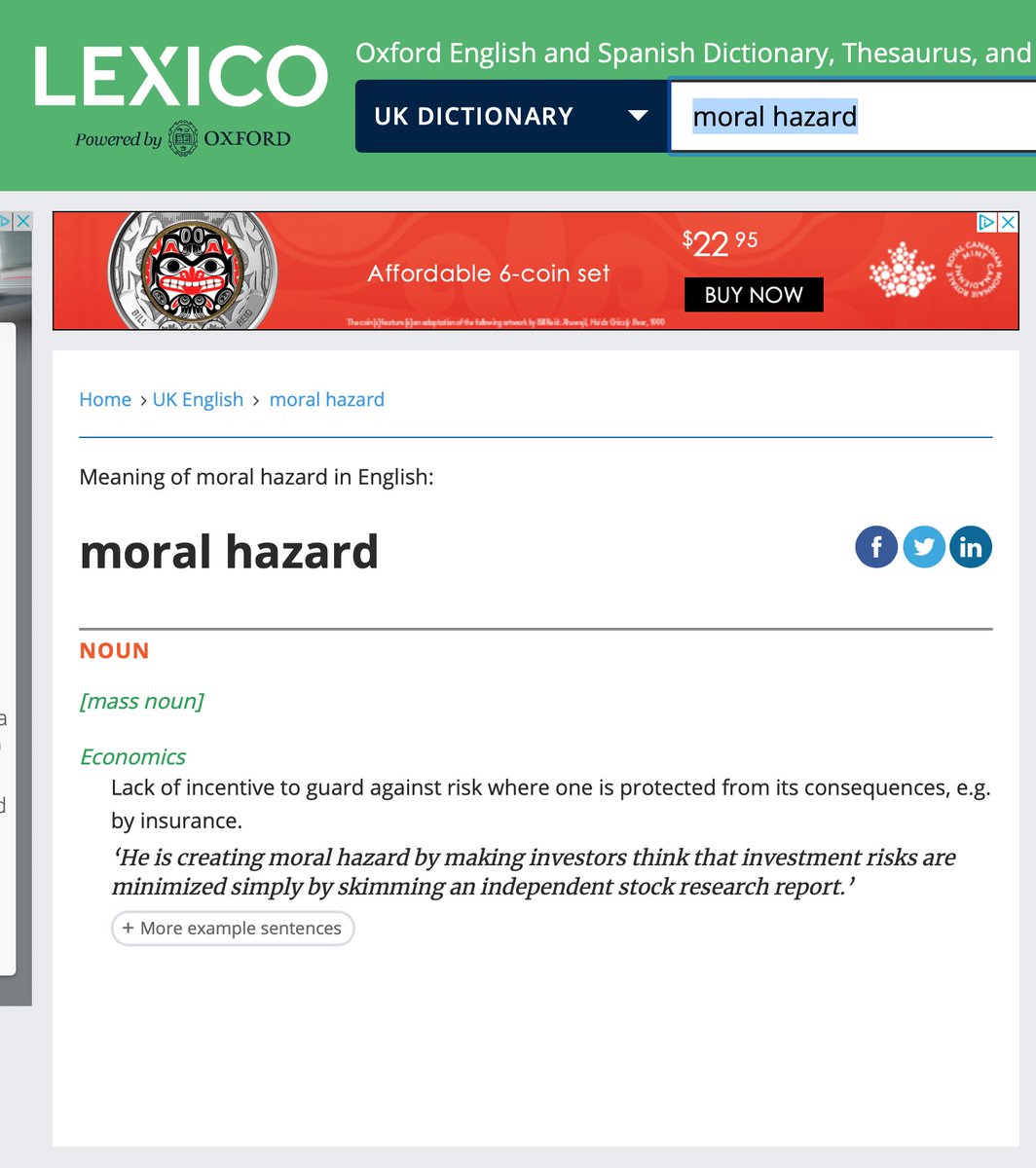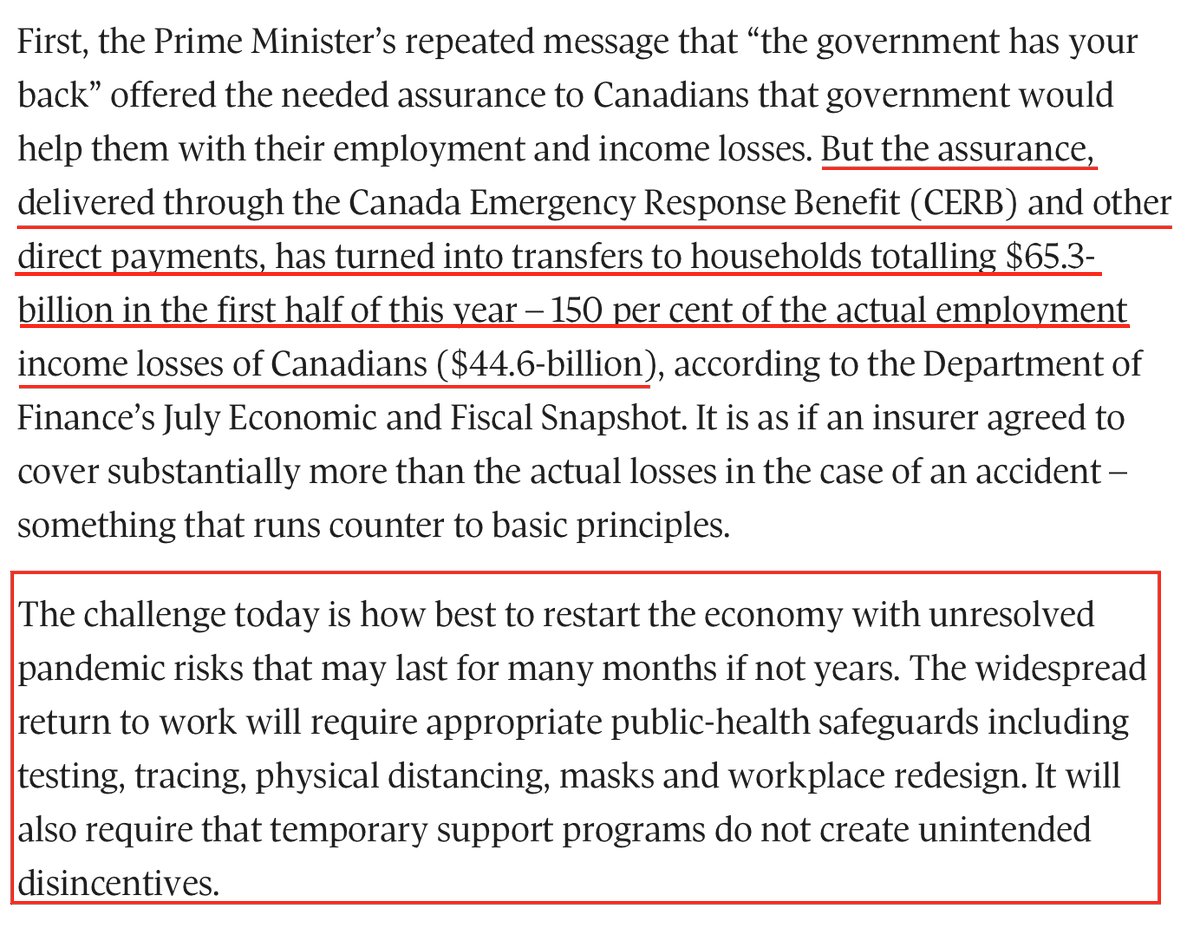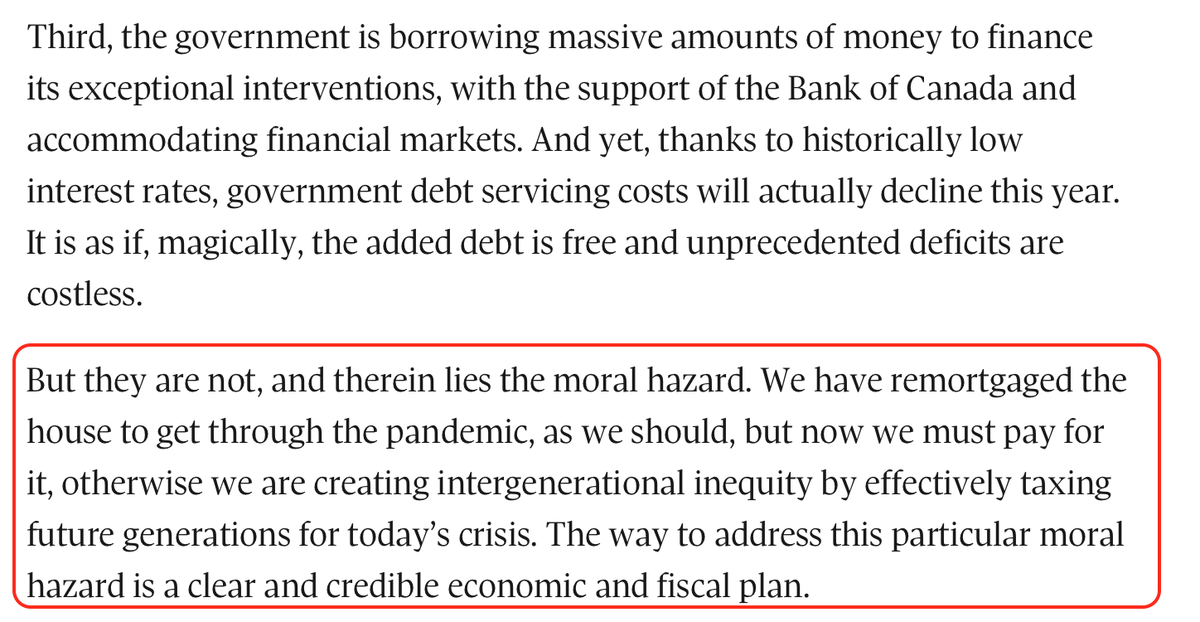Since our conservative media has decided that "Canadians are lazy", let's take apart the latest pile of steaming garbage that The Globe and Mail decided to not paywall. /1
#cdnpoli https://www.theglobeandmail.com/opinion/article-canadians-risk-becoming-addicted-to-pandemic-aid/
#cdnpoli https://www.theglobeandmail.com/opinion/article-canadians-risk-becoming-addicted-to-pandemic-aid/
This thing is basically conservative talking point bingo in one 700 word column.
a) Workers are lazy
b) Borrowing money is "placing a burden on future generations"
c) You can _NEVER_ pay people more than they would get from working /2
a) Workers are lazy
b) Borrowing money is "placing a burden on future generations"
c) You can _NEVER_ pay people more than they would get from working /2
http://Lexico.com gives us the following definition of "Moral Hazard":
https://www.lexico.com/definition/moral_hazard
/4
https://www.lexico.com/definition/moral_hazard
/4
In itself, this isn't unreasonable, but, how they use the concept in formulating their argument is profoundly unreasonable because it ignores key structural changes that have occurred in our economy in my lifetime. /5
Assumption #1: It is a "bad thing" if we pay people _more_ than they would have earned at work, it's a bad thing.
The reality is that businesses have been suppressing wages for decades now - at least since 1980, resulting in many workers being underpaid. /7
The reality is that businesses have been suppressing wages for decades now - at least since 1980, resulting in many workers being underpaid. /7
$2K / month isn't by any means excessive - it's $24K annually, and frankly, in today's world, that isn't a heck of a lot of money.
If people are "being overpaid" at $2K, then I would argue that they have been substantially underpaid in their jobs. /8
If people are "being overpaid" at $2K, then I would argue that they have been substantially underpaid in their jobs. /8
... and we should ask whether companies have been keeping up their end of the "social contract" with respect to workers. /9
Arguably companies had created a moral hazard by downloading risk to workers in the form of keeping wages far too low for the worker to have any chance of mitigating the risk of sudden loss of income. /10
Assumption #2: People won't want to return to work.
This is the updated version of the 1970s "welfare queens" claim that the GOP manufactured to justify gutting social assistance programs. /11
This is the updated version of the 1970s "welfare queens" claim that the GOP manufactured to justify gutting social assistance programs. /11
There is a fundamental assumption that runs through the capitalist mindset that presupposes that workers are lazy, and will do everything they can to minimize the amount of work that they do. /12
The problem here isn't that workers aren't willing to work, it's that employers aren't willing to make it worth their while to do the work. The pandemic has shown this in spades, when the calculation for many is literally "is this paycheque worth my (or my family's) health?". /13
Add to this the massive power imbalance between the worker and the employer in terms of negotiating wages. I have heard the claim "Oh, you're getting paid within market norms" when being told that my pay rise for the year wouldn't even meet inflation. /14
The employer is in the position of literally defining what "the market" is for wages, not the employee. This, combined with working conditions, is what gives rise to unions in the first place. The pandemic becomes part of the working conditions. /15
This is absolute nonsense. The "mortgage" analogy, again makes the overly simplistic mistake of comparing household finances with government finances. /17
In the wake of WWII, governments took on huge amounts of debt rebuilding their nations, and reintegrating returning soldiers into society and the workforce. /18
A world economy that had been on a war footing since the late 1930s needed to be put on a new path, and public investments in everything from industry to infrastructure was huge. /19
At a glance, it likely took decades to "pay off" those investments, but it built the infrastructure - both physical and social - that carried us from the end of WWII through to the mid 1980s when we started to dismantle it either by neglect or conscious policy. /20
If we face a "moral hazard" going forward from the COVID19 pandemic, it is not government debt. Instead, it is actually an issue of the moral hazard that corporate capitalism has created by its downloading of risk to individual citizens. /21
There was an unintended consequence that was revealed when COVID-19 broke out and we had to take drastic steps to exert control: so many people were on the edge of bankruptcy that the government had to step in to prevent a larger collapse. /22
The responsibility for this lies at the feet of the corporate machines that decided they are somehow exempt from responsibility for their employees.
Workers became an expense to be managed and minimized. Contributing to the greater good of society had to have a "return". /23
Workers became an expense to be managed and minimized. Contributing to the greater good of society had to have a "return". /23
... and if it couldn't be quantified on the corporate balance sheet at the end of the day, it didn't happen.
The role of greed and short sighted business decisions should not be overlooked in the economic recovery from COVID19. /24
The role of greed and short sighted business decisions should not be overlooked in the economic recovery from COVID19. /24
Not only must the government fabricate a new social safety net which benefits the people, the corporate world must be brought to task for its role in setting the preconditions for an economic collapse that required such drastic interventions on the part of the government. /25
. @threadreaderapp unroll

 Read on Twitter
Read on Twitter





